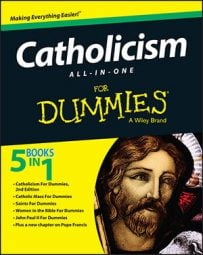In the Catholic Church, St. Thomas is perhaps best known for his post-Resurrection confession to the risen Savior. After the Crucifixion, most of the Apostles were devastated; they didn't quite grasp the fact that Jesus was the Messiah. When the Lord appeared to them on that first Easter Sunday, Thomas was missing.
When the other Apostles told Thomas about seeing the risen Lord, Thomas said he wouldn't believe it was Jesus until he had seen and felt the Lord's wounds for himself — thereby becoming known as Doubting Thomas (and thus the namesake of skeptics who demand proof before being convinced).
A week later, the risen Lord once again appeared to the Apostles, and this time Thomas was present. He had Thomas probe his wounds, and Thomas made his solemn confession of faith in the risen Savior. Thomas's doubt has become the certitude of faith for all those who weren't eyewitnesses to the Resurrection. His famous confession is a classic for all those preparing to receive Holy Communion at Holy Mass: "My Lord and my God!"
Galilee (first century a.d.–a.d. 72)
Patron: India, Pakistan, doubters
Feast day: December 21
There are many folkloric tales concerning Thomas, but most historians agree that he evangelized India, where he was martyred. Christians belonging to the Syro-Malabar Rite attribute their group's foundation to Thomas.
Legend has it that King Gundafor commissioned Thomas to build a palace. He gave Thomas the money and then left on a long journey. When he returned, the monarch asked to see his new home. Thomas had spent all the money to help the poor and told the king that he had built him a heavenly home instead. Gundafor ordered Thomas's death, but the night before the execution, the king dreamt of his dead brother, who told him of the gorgeous home Thomas had built for him in heaven. The next day, the king released Thomas, and his whole family converted to Christianity. King Mazdai, however, didn't convert and was enraged when his wife did. He had Thomas speared to death in a.d. 72.
The apocryphal Gospel ascribed to Thomas was probably written by Gnostics who sought to vindicate their heretical ideas, and thus it isn't part of the Canon (approved lists of inspired books) of the Bible.

